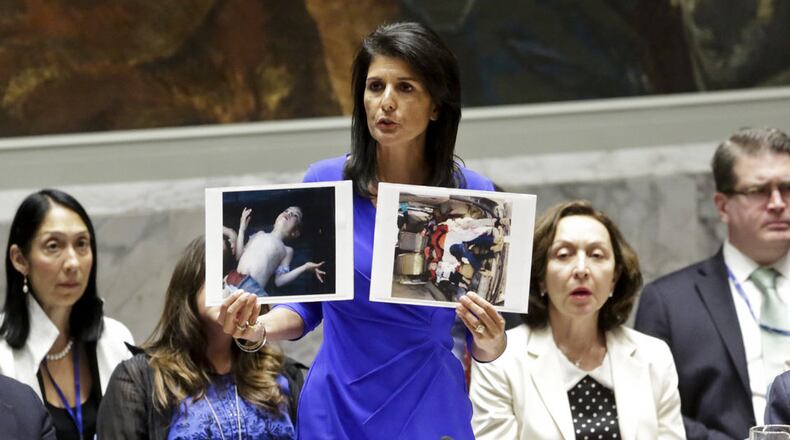Angered by a sarin gas attack on a Syrian village last week, President Donald Trump last night ordered the launching of 59 Tomahawk missiles at the Syrian air base that is believed to have initiated the attack.
The target was appropriate; the attack measured and well-justified. But the decision raises a lot more questions than it answers, including the most important of all:
What next?
It's pretty stunning that just last week, Trump was refusing to even dip a toe into the Syrian mess, with his secretary of state and U.N. ambassador announcing that the United States no longer sought the removal of Syrian leader Bashar al-Assad. The official attitude was that despite the horrific human toll, Syria just isn't our fight, a sentiment that Trump himself had expressed for years as a private citizen.
A few days later, we are suddenly in waist-deep, not as a result of a discernible strategy or policy but in a visceral response to the news of the day and to photographs of dead children.
“Years of previous attempts at changing Assad’s behavior have all failed, and failed very dramatically,” as Trump told the nation last night. “As a result, the refugee crisis continues to deepen, and the region continues to destabilize, threatening the United States and its allies.”
All of that is true, but none of it is changed by last night's attack. Indeed, the town of Khan Sheikhun, the site of last week's atrocity, was reportedly attacked again just this morning by a Syrian or Russian plane, this time carrying conventional weapons. The killing goes on.
If the president is serious about his statement last night -- if he truly does recognize that the displacement of millions of Syrians and the destabilization of their country threatens the United States and its allies, if he's sincere in calling upon "all civilized nations to join us in seeking to end the slaughter and bloodshed in Syria," -- then it's going to require a lot more than Tomahawk missiles. It will require a full commitment of American influence and leadership, with the much-maligned soft power of diplomacy and foreign aid and negotiation playing a major role.
But beyond last night's rhetoric, I see no sign that such an effort is forthcoming or that the Trump administration is capable of even trying. To the contrary, administration and Pentagon officials are describing last night's attack as a limited and contained, intended only to punish Assad for his use of chemical weapons. So it is little more than a gesture, an exercise in virtue signaling.
And as we know, even "limited" military interventions can often have unlimited, unpredictable consequences. For example, how will Russia respond to this attack on its ally? Russian troops stationed at the Syrian airfield had been warned of the attacks beforehand and suffered no casualties. But in the aftermath, Russian officials immediately announced the cancellation of an agreement intended to avoid conflicts with U.S. and Russian aircraft over Syria, and President Putin condemned the United States for launching an attack on a sovereign government under a "contrived pretext."
According to the Associated Press, the Russians also announced an immediate upgrading of Syria air-defense systems, a move intended to raise the pricetag of any further American action.
“The U.S. is being dragged into the war in Syria in the full knowledge that Russia is supporting Syria and our troops are there, which means it’s fraught with direct clashes between Russia and the U.S. and the consequences could be the most serious -- even armed clashes and exchanges of strikes,” as one Russian legislator told Interfax.
In short, we don't get to just walk away from Syria after last night's attack, content that our national honor has been satisfied and that our horror at Assad's brutality has been appropriately registered. But I'm guessing that's exactly what the Trump administration has in mind.
About the Author
The Latest
Featured



